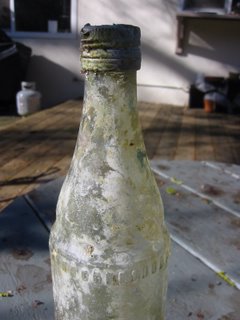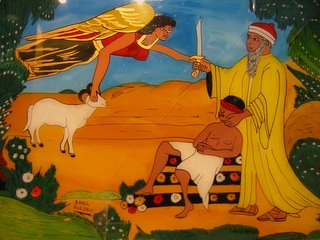I agree that it is important for each of us to listen well enough to know the answer to this question, but I am not sure that I am the person people should be listening to.
Ideally, we should be listening to Muslim friends and that what we think of each other is part of a real friendship. But, given the realities of the barriers between Muslims and Christians, barriers that limit both the instances and depth of personal relationships between Christians and Muslims, this question, and its counter question, what do we think of Muslims?, we cannot come up with accurate answers very easily.
Before I get into some possible answers to the question, it is also worth noting that the question itself is highly reductionistic. Think about the following:
- How can one dare think of an answer that would work for all 1.3 billion Muslims in the world today? Do all Muslims think alike? Do some Muslims like Christians and hate Westerners?
- When we ask what they think of "us", who is "us"?
- Are we asking what they think of Christians or what they think of Westerners?
- Is there a difference between a Westerner and a Christian (I think there is!!!)?
- Is there a difference "in the Muslim mind" (I beg forgiveness for even using that expression) between Christians and Muslims?
- How can one dare think that it is possible to discover the answer that the 1.1 billion Muslims would give when they don't have a friendship with a Christian? Who is going to ask them?
Assuming the question is what do Muslims think of Christians? might help us focus on the real issue: If the 1.1 billion Muslims who do not have a friendship with a Christian have an opinion about Christians, what is it based on?
It is a common thing for Christian missionaries to say that Muslims consider the terms "Christian" and "Westerner" to refer to the same people and values. So that they think that the sex and violence in Hollywood movies is a reflection of Christianity, or to conclude too quickly that Westerners who visit their countries are Christians and that their behavior reflects Christian values, or even to say that the West's "war on terrorism" is a continuation of the Crusades and a reflection of Christianity's hatred or fear of Islam.
If Muslims do not know Christians (or, more importantly than those who are Christian in name, they may never have met people who seek to be followers of Jesus) it could be easy enough to think that Western Culture is Christian Culture, just as we think Middle Eastern Culture is Muslim Culture when in fact there are many Arab Christians and, in fact, most Muslims are not Arabs.
I could go on. The point I want to make, though, is that Muslims are probably as ignorant of Christians as real human beings as Christians are of Muslims. Our impressions of each other are formed through different means and are part of the great wall of separation and hostility that has characterized Muslim/Christian/Western relations for 12 centuries.
It might be important for us to understand where Muslims can draw from to form an opinion about Christians or about Westerners.
- Islam has a place, in its holy book (in the Koran) and in its theology, a place for Jesus, the founder of Christianity. Muslims are forced to answer for themselves the questions, who is Jesus? Is the Bible accurate?
- The opposite is not true. Mohammed is not in the Bible and most theologians, unless they specialize in comparative religion or in the encounter of Christianity with other religions, do not have to worry about the meaning of Mohammed's life and religious claims or even about the Koran.
- Mohammed was married to a woman from a Christian background and Mohammed lived among pagans, Christians and Jews. Though most Christians today would consider the forms of Christianity he encountered heretical, Muslims have an understanding that their version of monotheism is better than Christian or Judaism. In fact, for them, it is based on God's corrective and final revelation of His Word, the Koran.
Getting to an answer to the question...
Words in Islam that refer to Christians:
- people of the book recognizes the revelation about Jesus that was entrusted to Christians. The Injil (New Testament) is a true revelation, though Christians are accused of changing it to promote deceptions they made up after Jesus died (such as that he is God). Nonetheless, this description is positive.
- infidels describes Christians as NOT believing the truth about God as revealed by Mohammed and expressed in the Koran.
- dhimmis is the name for Christians who, in Islamic society, are allowed to continue to follow their Christian faith.
Christians are both tolerated and protected by Islamic law. This creates an interesting situation. Muslims can legitimately claim that they are more tolerant toward Christians than Christians are toward Muslims. At the same time Christians can rightly argue that Islamic freedom of religion does not include freedom for Muslims to become Christians.
Why the double standard? Perhaps it is related to the belief held by many Muslims that as each country, region or people group submits to Islamic law, the world gets closer to a world that will finally be in harmony with God's design. The forward march of Islam can be seen by some Muslims as an irreversible sign of the grace of God. Under such a vision, it is easy to understand how there might be freedom to become a Muslim, but none to stop being one!
So, having made this long discourse, can we find a one sentence answer for the question: what do Muslims think of us?
Here are some one sentence answers:
The western system has come to an end primarily because it is deprived of those life-giving values which enabled it to be the leader of mankind.
--Sayyid Qutb in Milestones, p8, 11
Why do you not acknowledge our prophet?
--man on the street, Morocco
Why won't you allow us into western society?
--immigrants from the Middle East
You Christians are better Muslims than we are!
--a frequent comment by local Muslims to Christian humanitarian workers in their communities
many Muslims view the West
as the source of colonialism, racism, and immorality while Islam
is viewed as the fount of equality, justice, and godly civilization
--Bernard Adeney-Risakotta in SojoMail Nov 13 2002
I began to think to myself, how could such a man be condemned to hell [for not being a Muslim]
--Mehdi Abedi in Debating Muslims: Cultural Dialogues in Postmodernity and Tradition
So...
I think finding an answer to the question can be a fruitful endeavor, but I hope we can do it with careful attention to our own motives and methods:
- I know this was not my friend's intention when he asked the question, but it is important that when we ask what Muslims think of us that we do so honestly. If our answer will be an excuse to either love them, or hate them, we will have forgotten God's proactive stance toward humans and we will be reaction.
- If we are asking the questions so as to merely study about them (to enter into the debate about the legitimacy of orientalism), we should be careful that we not do this as an alternative to actually meeting, knowing and engaging individual Muslims about the things that are important to us and to them.
- Our biggest challenge is to break down the walls of separation that keep us from knowing Muslims and them from knowing us. These walls keep us from knowing our Muslim neighbors and from accepting them into our lives. These walls keep us from being a bridge over which the Holy Spirit can make the living Jesus we follow known to Muslims.
The peace of our world today is directly affected by geographic and social barriers that keep Muslims and Christians from knowing each other at the personal level. Most Muslims go through life without meaningful contact with the few Christians who live among them and Christians are unaffected by the few Muslims in their part of the world. Muslims who know no Christians and Christians who know no Muslims make our world more dangerous.
By avoiding each other, we do nothing to reduce the violence inherent in both the West's war on terrorism and in Jihad, fighting in the way of Islam for the world to submit to God.
But, breaking down the barriers is not a panacea. Getting people together can cause clashes as much as it can cause reconciliation. It is, however an essential first step if we are going to be experience the fulfilling of God's goal to reconcile all humanity in Jesus, make His good gifts available to all peoples and put an end to injustice. That happens when Jesus followers and Holy Spirit carriers live in close contact with people who haven't been introduced to Jesus yet or touched by God's Holy Spirit.
Perhaps the most important question I can ask myself: what do I think of Muslims? Is what I think of Muslims in line with what God thinks of Muslims? Am I willing to go out of my way to be a friend to Muslims here and around the world?
Summary:
What to Muslims think of us? Ask a Muslim.
What do we think of Muslims? We need to ask ourselves the hard questions.
As for what God thinks of Muslims. Maybe we need to ask Him!



